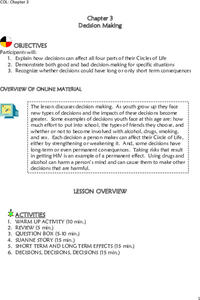Foundation for a Drug-Free World
The Truth About Drugs
Teenagers hear many messages about drugs from advertisements, their peers, their teachers, and their parents. But who is lying? What is the truth? A thorough, thoughtful unit takes a purposeful look at drug education, drug culture, and...
US National Library of Medicine
Drug Use and Abuse: Past and Present
Pick your poison: tobacco, alcohol, opiates, cocaine, or marijuana. An online exhibition launches a research project that asks groups to select one of the five drugs and gather information on how the use of the drug and the regulations...
Nemours KidsHealth
Alcohol: Grades 9-12
Two activities ask high schoolers to consider the role of alcohol culture in their lives. First, groups analyze the types of appeals used in newspaper ads for alcoholic drinks and compare those images with what they have observed....
Curated OER
Full Circle Advertising: A Look at Teen Alcohol Use and Fetal Alcohol Syndrome
High schoolers analyze ads and learn about the effects of alcohol. Note that the PowerPoint mentioned in the procedure is not included, so you will need to prepare your own presentation. After the lecture, segue into fetal alcohol...
Nemours KidsHealth
Alcohol: Grades 6-8
To get the word out about the realities of teens and tweens drinking alcohol, class members engage in two activities. For the first, groups design highway billboards about the dangers of alcohol drinking. Class members then create a...
Council for the Curriculum, Examinations and Assessment
Drugs Awareness
Legal and illegal. Use and misuse. Risks and consequences. Myths and facts. Class members investigate the effects on the body of various drugs, including cannabis, nicotine, and alcohol.
PBS
Stories of Painkiller Addiction: Contemplating Nature vs. Nurture
Does having an addict in your family make it more likely to become one yourself? Explore the genetic risk factors, as well as the prominent environmental influences, for substance addiction in a lesson that encourages awareness and open...
Florida Department of Health
Understanding the Risk of Substance Abuse Unit
Teenage brains are different! Understanding that the teenage brain is still developing and thus more impacted by substance abuse is the key concept in a three-lesson high school health unit. Participants learn about how the brain and...
RAND Corporation
Project ALERT
Why do people use drugs? What are the consequences? The alternatives? How can young people resist the pressures to use drugs? The Project Alert drug prevention program provides middle schoolers with the information they need and the...
NOAA
Watch the Screen!
Can a sponge cure cancer? Life science pupils visit the drugstore under the sea in the fifth activity of six. Working groups research the topic then get hands-on experience by testing the inhibiting effects of several plant extracts on...
Steered Straight
Marijuana Awareness
February is Marijuana Awareness Month, and a set of interdisciplinary activities can make your class aware of the social, medical, legal, and psychological effects of marijuana. With writing prompts, research opportunities, and...
Carfleo
Substance Use and Abuse
What is substance abuse? What is the difference between a depressant and a stimulant? Here is a comprehensive unit on drug use, including three lessons with such activities as categorizing and defining key terms, identifying issues...
University of Minnesota
Motor Learning and Memory
What do our brains have to do with reaction timing? Everything! In a hands-on learning activity, young scientists participate in four card activities that measure reaction timing. Each activity gets progressively more complex, and...
PBS
Stories of Painkiller Addiction: Commitment to Recovery
Recovery from substance addiction is an ongoing process. The final lesson in a series about painkiller abuse and addiction prompts learners to research various recovery options before writing a short story about a character who is going...
Curated OER
Getting Help: Food Stamps and Nutrition Programs
Here is another lesson regarding the law. This time, the laws that dictate eligibility for food stamps is the focus. After an initial discussion about the basics of the laws, learners do a case study of a family who is applying for food...
Healthy Native Youth
Chapter 3: Decision Making
By way of group discussion, reading, and role-play a series of six activities encourage scholars to make responsible decisions. Following an online introduction, pupils review the concept of volition and answer questions. Middle...
Social Skills Central
Don't Get Mad...
Pupils discover important alternatives to expressing anger and how to better manage their emotions through a collaborative discussion activity with their classmates. This resource includes nearly 100 (99, to be exact!) hypothetical...
Social Skills Central
Ready, Set, Respond!
When faced with a difficult situation, do you respond selfishly, face it head on, or ignore the problem? This game encourages learners to evaluate the wide range of reactions we can have to problematic situations, and how our responses...
Department of Education (Ireland)
Understanding Influences
"Understanding Influences," a richly detailed, carefully scaffolded unit, asks middle and high school scholars to examine how internal and external factors like friends, media, and society influence their attitudes and behaviors.
PBS
Using Primary Sources: Wide Open Town
A picture speaks a thousand words, no matter how old! Scholars use political cartoons from the era of Prohibition and the Temperance Movement to analyze what, a primary document (in this case, a bootlegger's notebook) is telling them...
American Psychological Association
Developing Adolescents
Why to young people act the way they do? Scholars investigate the stages of adolescent development incorporating high school psychology techniques. Using research from the American Psychological Association, they uncover the five areas...
Other popular searches
- Alcohol and Drug Prevention
- Alcohol and Drug Abuse
- Drug and Alcohol Awareness
- Drug and Alcohol Consumption
- Drug and Alcohol Abuse Survey
- Alcohol Adn Drug Prevention
- Alcohol and Drug Use
- Drug and Alcohol Education
- Teen Drug and Alcohol
- Drug and Alcohol Lesson
- Drug and Alcohol Abuse Costs
- Drug Alcohol Tobacco






















